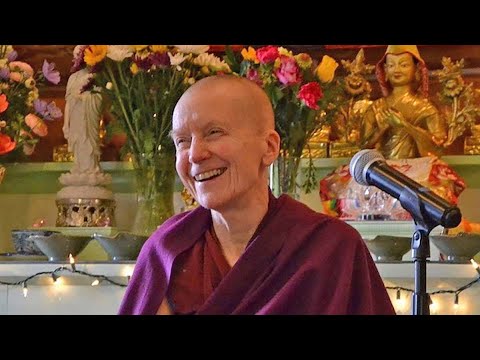Other types of afflictions
23 Samsara, Nirvana, and Buddha Nature
Part of an ongoing series of teachings (retreat and Friday) based on the book Samsara, Nirvana, and Buddha Nature, the third volume in The Library of Wisdom and Compassion series by His Holiness the Dalai Lama and Venerable Thubten Chodron.
- Wrong view, under ten nonvirtuous paths of action and in afflictive views
- Examining our wrong views and counteracting them through reasoning
- Comparison of mental factor of ignorance and mental factor of wrong views
- Different classifications of defilements
- Afflictions, underlying tendencies, auxiliary afflictions, fetters, pollutants, hindrances
- 10 afflictions from Pali tradition
- Lack of integrity and lack of consideration for others
- Attachment to sensual pleasures, anger, afflictive views, deluded doubt, arrogance, existence, ignorance
- Underlying tendencies for attachment,anger, ignorance
- Seeds of anger, attachment, ignorance
Samsara, Nirvana, and Buddha Nature 23: Other Types of Afflictions (download)
Contemplation points
- Make some examples of wrong views you personally hold that cut the root of virtue. How can you begin to train your mind in the correct view?
- What are some wrong views that you might have brought from another religion, the way you were raised, or from society in general that are not in line with the Buddhist view? How can you begin to train your mind in the correct view?
- Are wrong views you hold easier or harder to notice than the first five afflictions discussed in the text (attachment, anger, arrogance, ignorance, deluded doubt)?
- Which affliction is the strongest for you? Why is it important to be clear about your strongest affliction?
- What can you do to become more aware of your attachment to sense objects and let go of it?
- What effect do afflictive views have on your Dharma practice? What will help you to subdue them?
- What are the benefits of contemplating dukkha?
- Review each of the ten afflictions according to the Pali sutras. What are examples of each of them in your own experience? How does each hinder your happiness and the fulfillment of your spiritual aims?
- What are the three underlying tendencies that the Buddha said were particularly dangerous? Take some time to observe your experience of these three? What antidotes does the text teach to apply in each of those situations? What is needed to eliminate them?
Venerable Thubten Chodron
Venerable Chodron emphasizes the practical application of Buddha’s teachings in our daily lives and is especially skilled at explaining them in ways easily understood and practiced by Westerners. She is well known for her warm, humorous, and lucid teachings. She was ordained as a Buddhist nun in 1977 by Kyabje Ling Rinpoche in Dharamsala, India, and in 1986 she received bhikshuni (full) ordination in Taiwan. Read her full bio.


